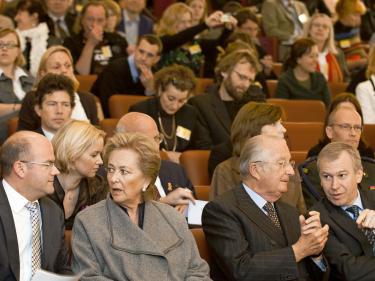Irish representation at EU poverty conference notably absent

The growing number of European 'working poor' was a focus of concern at the Ninth Annual Roundtable Meeting on Poverty and Social Exclusion held in Brussels on Monday and Tuesday this week. Despite the deteriorating financial situation of many Irish people, the Irish contribution to the meeting was weak. By Deirdra O Regan
Speakers at the meeting argued that the financial crisis must not serve as an excuse for government inaction on poverty. Indeed, the need for urgent measures to counter poverty was highlighted.
[Pictured: Delegates at the Ninth Annual Rountdable on Poverty and Social Exclusion]
The meeting, hosted in 2010 by the Belgian President, acts as a forum for government representatives, EU institutions, NGOs and representative citizens who experience poverty and social exclusion.
The fight against poverty is noted as one of the key priorities of Belgian presidency of the EU and this was supported by the attendance of King Albert and Queen Paola of Belgium and a number of senior government officials.
The conference and the European anti-poverty strategy in general have two main areas of focus; active inclusion and 'Europe 2020'. Active inclusion means the inclusion in the labour market and in society of those most excluded from the labour market. It supports measures such as adequate income support and access to services.
Europe '2020' is the Commission's 10 year growth strategy, which includes among other things an undertaking to reduce by 20 million the number of Europeans living in poverty.
Measuring real poverty in the EU is a difficult task, made all the more difficult by the fact that the majority of recent figures available are pre-recession (from 2006 and 2007).
Although the official tone was positive, many delegates at the conference shared fears that figures due to be released in coming months will show that, far from improving and moving towards he 'Europe 2020' vision, poverty in many member states is worsening.
These concerns were articulated by the European Anti-Poverty Network (EAPN). EAPN is deeply concerned about how the poverty target will be met when the EU is pressing member states to cut benefits and essential services in order to reduce public deficits.
Ludo Horemans, President of EAPN said:
"If the EU is serious about delivering on the poverty target... EU ministers must send a clear message on the need to implement a guarantee of adequate minimum income, defend social budgets in the crisis discussion, setting a road map about how they will progress towards a common framework as well as on a common methodology based on budget standards working from real needs".
The discussions and conclusions reached at the roundtable are recommendations and need further backing from the Commission if they are to have any real weight. At a time when Europe is preoccupied with fiscal policies and bottom lines, this may prove difficult to achieve.
Perhaps the most practical benefit of the conference is that it gives those working in the areas of poverty and social exclusion an opportunity to share best practise methods across EU member states.
Ireland was relatively underrepresented at the event, although there were a number of Irish individuals listed to attend. These included Professor Hugh Frazer from NUI Maynooth, Catherine Hazlett, a Principle officer in the social inclusion division of the Department of of Community, Equality and Gaeltacht Affairs and James Walshe, Assistant Principal with the same department.
However, there was no visible Irish contribution to the conference. This is disconcerting. While many of our EU colleagues, particularly the newer member states, are making some progress in terms of poverty, Ireland is regressing. Despite charges the Ireland "has turned the corner" economically, unemployment is on the increase and the numbers in mortgage arrears and negative equity are increasing, threatening to plunge even more Irish into poverty. Measures taken in the middle of the last decade to bring people out of the poverty are set to be reversed. And arguably, the policies and institutions to address wider, endemic poverty have failed.
As one Austrian delegate appositely put it in Brussels:"There is a lot written about poverty, but you can't eat paper, it does you no good."
